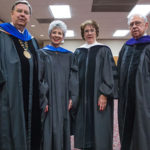The following article does not constitute legal advice but is intended to provide churches with questions to ask with regard to the formation of a security response.
During worship on Sunday, Nov. 5, 2017, Devin Patrick Kelley walked into First Baptist Church of Sutherland Springs and shot and killed 26 people, and he wounded 20 others. The response to this mass shooting was immediate and has continued to reverberate through houses of worship.
Churches all over Texas and elsewhere scrambled to assemble security teams to prevent a similar occurrence. Unfortunately, these churches may have created a new problem for themselves.
On the same November morning, Manuel Garcia shot and killed his ex-wife and her boyfriend outside St. Alphonsus Church in Fresno, California.
According to the FBI, 220 active shooter situations occurred between 2000-2016, said John Litzler, director of the church law division of Christian Unity Ministries, during his workshop at the Cooperative Baptist Fellowship 2018 general assembly in Dallas. Eight of those incidents, or 3.6 percent, happened in houses of worship. Most were robberies or spillover from domestic disputes. Some actually targeted the religious group.
While active shooter incidents in houses of worship are rare, eight occurring over 17 years, three such incidents occurred in 2017 alone, two on the same day.
Church security is broader than gun violence
Litzler told workshop participants to “think broader [than gun violence] about church security.” Churches need to think about chemical attacks, cyber attacks, bomb threats, robbery, vandalism, natural disasters, child abductions and other things that have occurred at places of worship.
In thinking through other security concerns, churches should consider what kinds of events happen in close proximity to them, such as parades, marathons or concerts. Think about how many people may flood your facility if a violent incident happened nearby. How would you handle those people in that situation?
Be proactive in developing a crisis response plan
• Know your nearest emergency responders. How far away are your nearest first responders and who are they?
Sign up for our weekly edition and get all our headlines in your inbox on Thursdays
• Invite first responders to tour your facilities and provide them blueprints. During their tour, ask them to help you strategize and plan for emergency events. For example, where will people shelter during a tornado? What entrances to the building pose security threats?
• Create safety and security policies and review them regularly. Schedule your review to coincide with your state legislature. The Texas legislature convenes every two years and makes changes to the law that may affect your policies.
How the law affects and complicates church security
Be familiar with the legal requirements of your local jurisdiction. What follows pertains only to Texas.
In 2015, the Texas Legislature amended the Texas Penal Code to allow gun owners to open carry. Previously, gun owners were allowed to conceal carry with a permit unless prohibited by a private property owner under state statute 30.06. After Jan. 1, 2016, gun owners are allowed to open carry with a permit unless prohibited by a private property owner under the new state statute 30.07.
Churches in Texas have four options with respect to guns on their premises.
- Allow all guns, which is the default position and does not require any notice.
- Prohibit all guns, which requires oral or written notice under 30.06 and 30.07 according to the specifications of the Texas Penal Code.
- Allow only concealed carry and no open carry, which requires oral or written notice under 30.07 according to the specifications of the Texas Penal Code.
- Allow only open carry and no concealed carry, which requires oral or written notice under 30.06 according to the specifications of the Texas Penal Code.
If a church in Texas opts to provide written notice under 30.06 and 30.07, the posting must follow the guidelines given in the Texas Penal Code.
Be aware that 30.06 and 30.07 are trespassing statutes, giving authority to the land owner. Under these statutes, churches are considered private property with the rights that apply to land owners.
If a church in Texas has a school, then a different statute applies. Texas Penal Code 46.03 prohibits firearms and other weapons on the premises of any school or educational institution, public or private. Whereas churches have private property rights under 30.06 and 30.07, church schools do not under 46.03.
A further complication of 46.03 relates to the word ‘premises.’ Under 30.06 and 30.07, ‘premises’ refers to the inside of buildings, allowing a person to leave a firearm in his or her vehicle in the church parking lot. Under 46.03, ‘premises’ includes parking lots, sidewalks, parks and other places where a school activity is taking place, such as Sunday school rooms.
In other words, the same person protected under 30.06 and 30.07 would be in violation of 46.03 if he or she parked in a school parking lot where school activity is taking place, boarded a school bus or attended a school event at a nearby park while carrying a prohibited weapon.
Churches take on legal issues by choosing a fifth option
Due to the cost and unsightliness of written notice requirements and the complexity of state statutes, many churches in Texas choose a fifth option—only the security team will be permitted to carry firearms. This, however, is not a safe option in Texas.
The fifth option could unintentionally create a de facto security team in violation of Texas Occupations Code 1702, which governs private security. In 2017, the Texas Legislature passed a blanket exemption for houses of worship, making compliance with 1702 easier.
Under the exemption, individuals providing security to churches in Texas must be volunteers and must avoid the appearance of being trained private security. Volunteers cannot receive any form of compensation, including gift cards, gift bags or other item of monetary value. Volunteers under this exemption should not wear any article of clothing labeled ‘safety’ or ‘security’ in order to avoid even the appearance of being trained.
While the exemption to 1702 allows individuals to provide security to churches, churches must still be cautious. Statute 1702 only applies to individuals and does not remove liability from the church. If a church knowingly enlists individuals to provide security, and one of those individuals injures or kills another person on the premises, the church may be held liable for the individual’s actions.
Should churches have security teams?
Because security is a matter of discipleship and stewardship, churches should provide security and should be careful how they do it. Litzler suggests churches do the following.
- Engage a professional who can provide accurate legal counsel.
- Discuss safety and security measures with your church insurer and be prepared for premium increases if you allow a safety or security team to be armed.
- Form a diverse group that includes ministers to children and youth to inform emergency response plans.
- Layer your security using policies, visible cameras and greeters who observe and report suspicious behavior.
- Train individuals providing security to comply with state statutes.
- Partner with other churches to fund security.
- Don’t arm your safety or security team but train the team in preventative measures, such as welcoming people while still in the parking lot. An unarmed security team is not subject to 1702.
- Hire off-duty law enforcement. This is the best option in Texas if a church can afford it because 1702 does not apply in this situation and it develops good relationships with first responders.
None of these measures prevent a lawsuit. They do demonstrate your concern for the safety of those in your care. No one will begrudge you that.
Eric Black is the executive director, publisher and editor of the Baptist Standard. He can be reached at [email protected]or on Twitter at @EricBlackBSP.















We seek to connect God’s story and God’s people around the world. To learn more about God’s story, click here.
Send comments and feedback to Eric Black, our editor. For comments to be published, please specify “letter to the editor.” Maximum length for publication is 300 words.